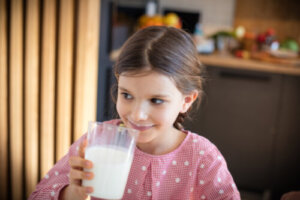5 Foods that Help Children Fall Asleep


Written and verified by the nutritionist Saúl Sánchez Arias
Ensuring a good night’s sleep for children is key to improving their development. Fortunately, there are a number of foods that can help children fall asleep and reduce the number of interruptions during the night. Therefore, the feeling when waking up in the morning will be much better.
It’s important to keep in mind that during the first stages of life, more hours of sleep per day are needed. However, these should take place during the night period, as the physiological effects of rest aren’t the same when this is done during the day. The biological clock plays a determining role in this aspect.
Foods that help children fall asleep
Here, we’re going to show you which are the best foods to help children fall asleep and offer them good quality rest.
1. Bananas

Bananas are a source of two important minerals to increase muscle relaxation: Potassium and magnesium. The former also has the ability to modulate blood pressure downward, according to a study published in the Journal of Clinical Hypertension. Both effects are determinant when it comes to allowing a more effective sleep conciliation.
As if this weren’t enough, bananas also have tryptophan inside. This is a key amino acid for the secretion of serotonin and the subsequent synthesis of melatonin, the hormone that regulates the cycles of sleep and wakefulness. It’s important that the production of the latter is optimal to facilitate relaxation and avoid nighttime interruptions.
2. Nuts
Nuts contain tryptophan, magnesium, and a large amount of essential nutrients that improve the functioning of physiology and rest. However, they shouldn’t be offered to younger children, as there are risks of allergy and choking.
3. Dates
After dinner, dates can be consumed to help children fall asleep and provide them with a better’s night’s sleep. These fruits have vitamin B5 and pantothenic acid. They’re also a source of fiber, which increases the feeling of satiety. For many children, appetite can be an impediment to falling asleep, so this should be avoided.
4. Milk
Milk is one of the best drinks that exist, along with water. For children as well as for adults. Not only does it provide essential nutrients necessary for good development and growth, but it’s also capable of improving the quality of rest. This is because it concentrates tryptophan, an amino acid that has been shown to play a determining role in relaxation.
However, when offering milk, always choose the whole variety. If the fat’s removed from this product, a large number of fat-soluble vitamins will be lost, such as vitamins A and D. Both are necessary to maintain a good state of health in the medium term.

5. Oats
Oats are undoubtedly the best cereal to include in the diet. It’s hardly refined at an industrial level, so its nutritional properties remain intact. The same cannot be said of other foods such as wheat, which undergo very aggressive mechanical processes.
In addition, oats are a source of soluble fiber, a compound that improves the health of the microbiota and increases the feeling of satiety. It also has melatonin in its interior and allows for the maintenance of stable blood sugar levels, thus improving the ability to fall asleep.
Introduce foods to help children fall asleep
If you want to ensure that your children sleep properly every night, don’t forget to introduce the foods that we’ve presented into their diets. They help children fall asleep and reduce sleep interruptions as the hours go by, which translates into more efficient recovery and repair processes. This is one of the bases to ensure an optimal state of health in the medium term.
In any case, keep in mind that for children to sleep well, it’s important that they arrive tired at bedtime. Therefore, physical activity should be promoted during the daily routine, from the earliest stages of life.
Ensuring a good night’s sleep for children is key to improving their development. Fortunately, there are a number of foods that can help children fall asleep and reduce the number of interruptions during the night. Therefore, the feeling when waking up in the morning will be much better.
It’s important to keep in mind that during the first stages of life, more hours of sleep per day are needed. However, these should take place during the night period, as the physiological effects of rest aren’t the same when this is done during the day. The biological clock plays a determining role in this aspect.
Foods that help children fall asleep
Here, we’re going to show you which are the best foods to help children fall asleep and offer them good quality rest.
1. Bananas

Bananas are a source of two important minerals to increase muscle relaxation: Potassium and magnesium. The former also has the ability to modulate blood pressure downward, according to a study published in the Journal of Clinical Hypertension. Both effects are determinant when it comes to allowing a more effective sleep conciliation.
As if this weren’t enough, bananas also have tryptophan inside. This is a key amino acid for the secretion of serotonin and the subsequent synthesis of melatonin, the hormone that regulates the cycles of sleep and wakefulness. It’s important that the production of the latter is optimal to facilitate relaxation and avoid nighttime interruptions.
2. Nuts
Nuts contain tryptophan, magnesium, and a large amount of essential nutrients that improve the functioning of physiology and rest. However, they shouldn’t be offered to younger children, as there are risks of allergy and choking.
3. Dates
After dinner, dates can be consumed to help children fall asleep and provide them with a better’s night’s sleep. These fruits have vitamin B5 and pantothenic acid. They’re also a source of fiber, which increases the feeling of satiety. For many children, appetite can be an impediment to falling asleep, so this should be avoided.
4. Milk
Milk is one of the best drinks that exist, along with water. For children as well as for adults. Not only does it provide essential nutrients necessary for good development and growth, but it’s also capable of improving the quality of rest. This is because it concentrates tryptophan, an amino acid that has been shown to play a determining role in relaxation.
However, when offering milk, always choose the whole variety. If the fat’s removed from this product, a large number of fat-soluble vitamins will be lost, such as vitamins A and D. Both are necessary to maintain a good state of health in the medium term.

5. Oats
Oats are undoubtedly the best cereal to include in the diet. It’s hardly refined at an industrial level, so its nutritional properties remain intact. The same cannot be said of other foods such as wheat, which undergo very aggressive mechanical processes.
In addition, oats are a source of soluble fiber, a compound that improves the health of the microbiota and increases the feeling of satiety. It also has melatonin in its interior and allows for the maintenance of stable blood sugar levels, thus improving the ability to fall asleep.
Introduce foods to help children fall asleep
If you want to ensure that your children sleep properly every night, don’t forget to introduce the foods that we’ve presented into their diets. They help children fall asleep and reduce sleep interruptions as the hours go by, which translates into more efficient recovery and repair processes. This is one of the bases to ensure an optimal state of health in the medium term.
In any case, keep in mind that for children to sleep well, it’s important that they arrive tired at bedtime. Therefore, physical activity should be promoted during the daily routine, from the earliest stages of life.
All cited sources were thoroughly reviewed by our team to ensure their quality, reliability, currency, and validity. The bibliography of this article was considered reliable and of academic or scientific accuracy.
- Chmielewski, J., & Carmody, J. B. (2017). Dietary sodium, dietary potassium, and systolic blood pressure in US adolescents. Journal of clinical hypertension (Greenwich, Conn.), 19(9), 904–909. https://doi.org/10.1111/jch.13014
- Binks, H., E Vincent, G., Gupta, C., Irwin, C., & Khalesi, S. (2020). Effects of Diet on Sleep: A Narrative Review. Nutrients, 12(4), 936. https://doi.org/10.3390/nu12040936
This text is provided for informational purposes only and does not replace consultation with a professional. If in doubt, consult your specialist.








